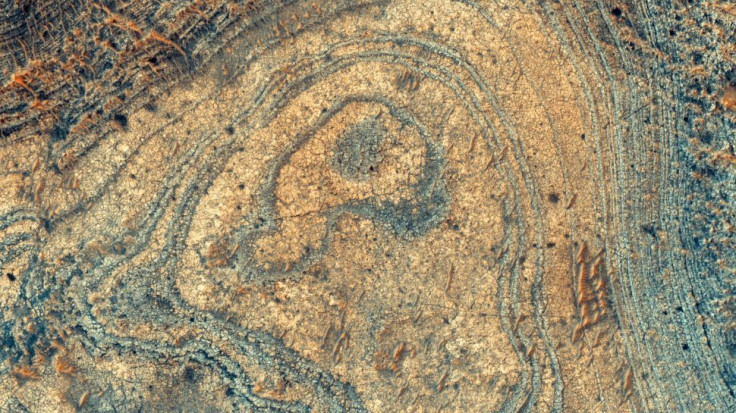'Marsquakes' Point To Trapped Water Under Mars' Frozen Surface

If you thought that earthquakes and tremors are only felt on Earth, you would be surprised to know that it also occurs on neighboring planets in our solar system, like Mercury and Mars.
NASA’s $800 million Insight Mars lander had been observing the activity and recorded the "first ever Marsquake" earlier this year from the interior of the planet. The Red Planet doesn’t have tectonic plates like Earth so the quake came somewhat as a surprise.
Now there are all kinds of theories that suggest what could be behind the Marsquakes, with the latest being the possibility of trapped groundwater under Mars’ frozen surface. Michael Manga, a planetary scientist at the University of California at Berkeley, came up with this idea, saying the Red Planet could be experiencing Oklahoma-like quakes.
Oklahoma's quakes were caused by the injection of water underground during fracking for natural gas. The water causes pressure increase and leads to slippages of tectonic plates at fault lines.
Manga and his colleagues explained that compressed aquifers can trigger Marsquakes. They attributed quakes to Mars' frigid temperatures, which freeze the aquifers’ upper layers. However, researchers say compression isn’t enough to get the ground of the Red Planet shaking. According to Space.com, their computer simulations identified two likely triggers, tidal tugs from Mars’ larger and closer orbiting moon -- Phobos, and changes in barometric pressure, which is due to the warming and cooling of the planet’s thin atmosphere.
Manga, whose study was published in the AGU journal Geophysical Research Letters, said the cold temperatures on Mars’ surface might penetrate downward into the liquid groundwater. He explained that this would freeze the top layers of groundwater and compress the still-liquid groundwater. “That pressurized groundwater could be loosening faults on Mars and causing just the sorts of shallow marsquakes that have already been detected by the Insight lander,” he said.
The scientist said that if water really exists, then in the near future, Mars explorers might be able to drill down to it. “And the water would come shooting out of the ground under its own pressure, like an artesian spring,” he said.
This hypothesis has got us all excited because water is an important ingredient for life and if grounwater really exists on Mars, the Red Planet could be inhabitable and even if home to alien life!
© Copyright IBTimes 2025. All rights reserved.





















